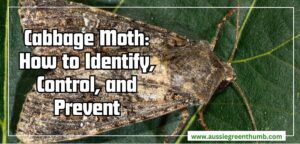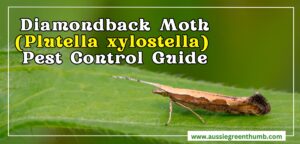It’s quite common for super keen gardeners who use every inch of their block of land to plant, plant, and plant some more. They may also find some room for small farm animals such as chickens or even goats.
But what happens when your plants and animals outgrow your garden?
The answer could be a hobby farm!More...
What is a Hobby Farm?
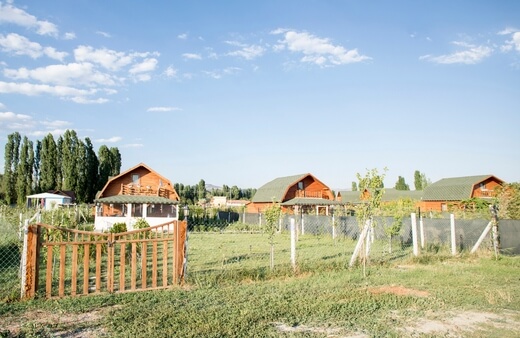
In Australia, a hobby farm refers to the utilisation of agricultural land that is 50 acres or less, for the purpose of either leisure and recreational activities and/or generating secondary income that is not the main source of revenue for the owner.
Keen gardeners who have taken their hobby to the next level may enjoy farming activities such as growing fruit and vegetables, rearing small farm animals, and making secondary products such as jams or organic preserves from their produce.
Hobby farms are properties that are big enough for keen gardeners to expand their ambitions but, at the same time, are small in order to become commercially viable farms.
The intention behind hobby farming is not necessarily commercial but to have a place in nature to retreat to, relax and be at peace, so it also serves a therapeutic motive. Said that some hobby farmers may introduce commercial activities that help with cost recovery by generating some earnings.
Is Hobby Farming a Form of Gardening?
Although hobby farming can be considered to be a branch stemming from gardening, and they do have some similarities, the differences in terms of the type and range of activities create a clear distinction between hobby farmers and gardeners.
A significant difference between hobby farming and gardening is that while the latter is limited to just botanical tasks of planting seeds, taking care of their growth and then harvesting them, the kind of activities practised in the former on the other hand, includes all the above and also rearing and tending to animals.
Due to this, hobby farming is characterised by a number of factors exclusive to it such as large land areas with plenty of natural resources such as fertile land, access to rivers, lakes, or ponds, and a suitable climate to raise, grow and cultivate a range of plants, crops and animals.
Hobby farming, therefore, demands much more time and money than hobby gardening.
Gardening, on the other hand, comprises mostly cultivating plants that grow into flowers, fruits, vegetables, and herbs, either for dietary consumption or simply for the process and its aesthetic look. A benefit of gardening is that it can also be done indoors as well as outdoors.
From your garden to the kitchen windowsill, plant and herb growth does not require much except for sunlight and water. So even if you live in a compact unit with no access to a backyard or much space, you can still practise your gardening and botany skills and even recycle everyday household goods such as plastic containers to act as pots.
All in all, hobby farming is more complex than gardening, because the main goal is to grow food and rear animals during your free time from work or during retirement rather than sell the produce as the main source of income.
However, added revenue can be seen as a perk for hobby farmers as, if they have excess vegetables for example, they can sell that on so that it doesn’t go to waste!


Get Your Free Guide:
Master Growing Australian Natives eBook
A Must Have Complete Guide for Every Australian Garden
Get Your Free Guide:
Master Growing Australian Natives eBook
A Must Have Complete Guide for Every Australian Garden
Difference Between Farming and Hobby Farming
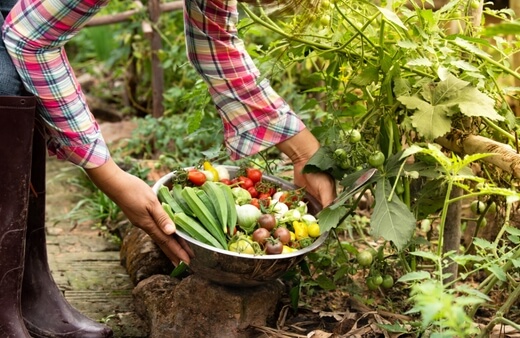
The generic meaning of a hobby farm as mentioned above is a small piece of agricultural land (less than 50 acres) where crops and plants are grown and livestock such as chickens, sheep, goats, horses, and pigs are fed and taken care of.
Since hobby farms tend to range in size, from a few acres up to fifty, one of the rules that owners of such land need to abide by is that they should not use it for any commercial purposes. In other words, it must not achieve significant income or become a lucrative business initiative, however, it can be used to earn supplementary income.
The reason for this is to promote the hobby of farming as opposed to the business of farming. With this in mind, hobby farming continues to be a recreational pastime for families all over Australia.
They raise animals and grow crops for the enjoyment of it and for the fresh organic foods they create as part of their diets. Hobby farms may also be used for non-agricultural-related activities such as horse riding or photoshoots and movie sets.
Depending on the size of the area, locality, and activities performed on this agricultural land, hobby farms are most likely regulated in accordance with certain Australian laws and zoning limitations.
These restrictions relate to the number of animals allowed to be raised on the farm, properly installing a boundary fence to protect the animals and crops, managing and discarding the waste of livestock in a manner that would lead to less air and water pollution and constraints on the use of fertilisers, pesticides and other chemicals on vegetation.
Financing Hobby Farms in Australia
In Australia, it is possible to get loans for hobby farms - just like for any other property purchase. Loans can cover not only the purchase of land but also the equipment needed to operate them. Talking to a rural mortgage broker is probably a good starting point to understand eligibility criteria.
If finance is not available to buy a bigger patch of land, there is always the choice to practise vertical gardening which enables the growth of more crops and simultaneously takes less space.What to Consider when Planning to Buy a Hobby Farm
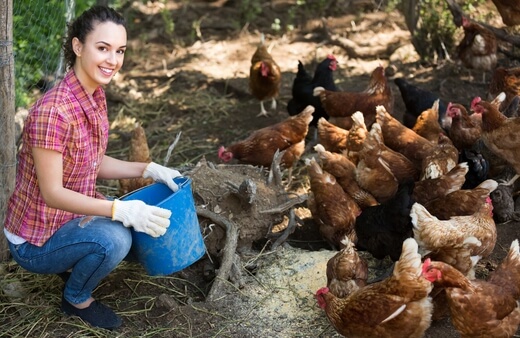
Before purchasing a hobby farm, you should take into account the following key factors:
Location and Accessibility: the location of the farm is crucial in terms of its proximity to necessary services and amenities, such as road access to grocery stores, availability of healthcare and educational facilities i.e. hospitals and schools, access to clean drinking water, and a nearby power grid to supply electricity at all times.
Buyers must ensure that the hobby farm's location fulfils all these practical purposes. In addition to this, the hobby farm should ideally not be situated too far from your home to make your life easy and not force you to spend long periods of time commuting.Size and Layout: The area of land bought should be proportionate to your plans on how to utilise the hobby farm. This should include the amount of crops you intend to grow, the number of animals you want to raise, the size of a barn, or other storage space and the availability of water for irrigation.
Climate: Data with regard to climate changes of the hobby farms’ location is vital to the successful growth of particular crops and the kind of animals that can live comfortably.
Local temperature variations and rainfall patterns should be taken into account to make sure agricultural activities you intend to carry out are possible, otherwise the hobby farm would no longer serve its purpose.Soil Type: Evaluating the quality and type of soil will help buyers determine if their choice of crops can be grown with ease and if the land can be prepared for planting them
Zoning Regulations: It’s always better to research any applicable zoning laws which will affect your intended purpose of the hobby farm. These can be related to restrictions on using chemicals, managing animal waste, the amount of livestock allowed on property, and specific ways of installing fences.
You can verify these regulations via local authorities and apply for any exemptions and it is highly advisable you do this right from the get-go.Cost/ budget: Since purchasing and running a hobby farm is an ongoing investment you should make sure that the total expenditure should not exceed your budget. You should calculate all costs related to running a hobby far and not just purchase price and taxes.
Taking into account animals, crops, fertilisers, equipment, food etc. is very important so that you don’t get caught out later. Don’t forget to factor in a little bit extra for unforeseen expenses!Finance for hobby farms in Australia: In case buyers are facing financial problems, you can search for alternative ways to finance your dream hobby farms. Take into consideration all factors including your personal budget, what borrowing options are available to you, the terms and conditions offered, and whether you think you can realistically pay back the money without getting yourself into debt.
Biosecurity risks: if you grow crops or keep farm animals, you need to be aware of and minimise the risks of unwanted diseases and pests that can damage not only your farm but also the wider farming community.
It is highly recommended to consult current and experienced hobby farmers and learn from their experiences - good and bad. You will certainly gain more clarity on what to do and what not to do before going down the farming route.
You can also make use of the internet through websites, forums, blogs, Facebook groups, podcasts, and youtube videos. You can also turn to books specific to how to set up hobby farming. Just make sure that you’ve done as much research as possible before investing your time and money into this venture.
Hobby Farming Frequently Asked Questions
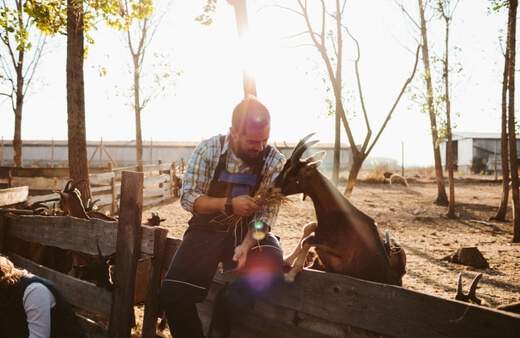
Are hobby farms difficult to run?
There are challenges for sure! Just like any garden, there’s work involved.
Owning a farm is a blissful dream. One where you can watch the sun rise and set over your fields whilst your animals run around. It is a dream many have when they think of retiring from their busy, city-based careers. However, the reality can be very different.
Farming can be a tough job that has hundreds of components that must be seen in order for it to be successful, even if it is just a hobby. Of course, for those that are passionate and are willing to work on their farm, the rewards can be enormous.
What should I grow on my hobby farm?
There are so many possibilities with hobby farms: flowers, herbs, beekeeping, chickens, ducks, goats, etc.
Should you decide to go for chickens, be more prepared by checking our in-depth guide for choosing the best chicken tractors in Australia.
Wrapping Up Our Hobby Farming Guide
If you are set on buying a farm but don’t know exactly what to grow or raise there, then ask around. Do some research, and try and get some information on what is easy to grow and manage or which animals are the easiest to take care of, especially if you are new to the farming world.
Try and make some friends and contacts in the agricultural community and be open to learning and taking advice from those who know more!
Published on February 20, 2023 by Gary Clarke
Last Updated on January 29, 2024



